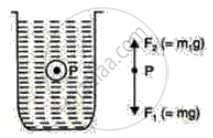Advertisements
Advertisements
Question
A wooden block floats in alcohol with 3/8 of its length above alcohol. If it is made to float in water, what fraction of its length is above water? Density of alcohol is 0.80 g cm-3.
Solution
Let length of wooden block = x
∴ Length of the block above alcohol = `3/8`x
Length of the block below alcohol
`= "x" - 3/8"x" = ("8x" - "3x")/8 = "5x"/8`
Density of water = `rho_"w" = 1 "gcm"^-3`
Density of alcohol = `rho_"alcohol" = 0.80 "gcm"^-3`
By the law of floatation:
`"h"_"block" xx rho_"block" = "h"_"alcohol" xx rho_"alcohol"`
`"x" xx rho_"block" = "5x"/8 xx 0.80`
`rho_"block" = 5/8 xx 0.80`
`rho_"block" = 0.5` gcm-3
When the block is floating in water:
By law of floatation:
`"h"_"block" xx rho_"block" = "h"_"water" xx rho_"w"`
`"x" xx 0.5 = "h"_"water" xx 1`
`"h"_"water" = 0.5 "x" "or" 1/2 "x"`
So, length of block above water = `"x" - 1/2"x" = "x"/2`
Fraction of the block above the water = `"x"/2 xx 1/"x" = 1/2` part
`=> 1/2 "th"` part of wooden block is above the water.
APPEARS IN
RELATED QUESTIONS
What is a fluid?
What do you mean by the term fluid pressure?
Select the correct option:
The apparent weight of a body in a fluid is:
What is meant by a fluid?
What is a fluid pressure?
A small stone of mass m ( = 200 g ) is held underwater in a tall jar and allowed to fall as shown in the following figure. The free-body diagram of the stone is also shown.
(i) What does F2 represent?
(ii) What does m1 represent?
(iii) What is the net force acting on the stone?
(iv) What is the acceleration of the stone as it falls through water? Neglect the force due to viscosity. Assume that volume of stone = 80 cml, density of water = 1.0 g cm-3 and acceleration due to gravity g = 10 ms-2.

